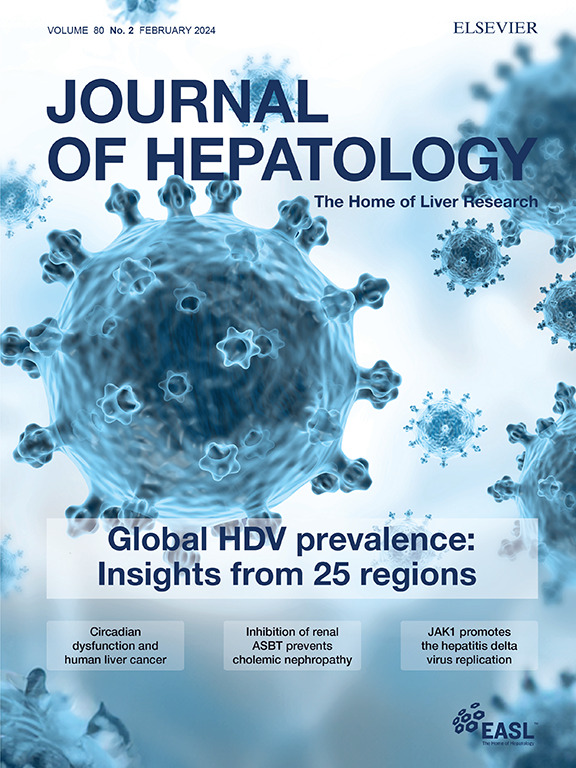回复:STRIDE在亚洲肝细胞癌中的疗效和安全性
IF 26.8
1区 医学
Q1 GASTROENTEROLOGY & HEPATOLOGY
引用次数: 0
摘要
部分snippetsAetiologyDrs。Liu, Shan和Han评论说,肝细胞癌(HCC)的病因因地区而异,乙型肝炎病毒(HBV)相关的HCC是亚洲主要的病因亚型。我们同意HCC病因的变异是一个重要的考虑因素,正如我们在出版物的引言和讨论部分广泛评论的那样。特别是,免疫检查点抑制剂(ICI)在hbv相关HCC中观察到的更好的相对结果是我们安全性的动机。Liu, Shan和Han关于我们出版物的安全性结果。我们专门和广泛地报道了在喜马拉雅亚洲亚组中观察到的免疫介导不良事件(imae)的发生率和性质,这与在全球喜马拉雅人群中观察到的情况相似,并特别指出STRIDE在亚洲亚组和全球人群中的总体安全性是可耐受和可控的。我们认为我们的结果已经适当地结合了背景,因为在讨论中注意到了一致的跨试验区域与全球趋势。具体参考了全球IMbrave150分析和IMbrave150中国亚群我们认为在CheckMate 040的背景下讨论III期随机对照HIMALAYA试验的结果的建议是不合适的,因为CheckMate 040是一项规模较小的非对照I/II期研究。作者的贡献:george Lau:手稿撰写和修订hassan K. abu - alfa:手稿撰写和修订stephen L. Chan:手稿撰写和修订资金支持:HIMALAYA研究由AstraZeneca赞助。医学写作支持,在作者的指导下,由Brian Woolums, PhD, CMC Connect, IPG Health Medical Communications的一个部门提供,并由AstraZeneca资助,按照良好出版规范(GPP 2022)指南(Ann Intern Med 2022; 1975:1298-1304)。竞争利益声明george Lau报道阿斯利康和百济神州的演讲费用。Ghassan K. Abou-Alfa报告了来自艾伯维、Agenus、Arcus、AstraZeneca、Atara、BeiGene、BioNtech、BMS、消化道护理、Elicio、Genentech/Roche、赫辛、派克研究所、Pertyze、Yiviva的研究支持,以及来自艾伯维、Ability Pharma、Agenus、Alligator Biosciences、Arcus、Astellas、AstraZeneca、Autem、Berry Genomics、BioNtech、BMS、Boehringer Ingelheim、Fibrogen、Genentech/Roche、Ipsen、J-Pharma、默克、Merus、Moma的咨询费本文章由计算机程序翻译,如有差异,请以英文原文为准。
Reply to: STRIDE's Efficacy and Safety in Asian Hepatocellular Carcinoma
Section snippets
Aetiology
Drs. Liu, Shan and Han comment that the aetiology of hepatocellular carcinoma (HCC) varies regionally, with hepatitis B virus (HBV)-related HCC as the predominant aetiologic subtype in Asia. We agree that variation in HCC aetiology is an important consideration, as we commented on this extensively in the Introduction and Discussion sections of our publication. In particular, the better relative outcomes observed with immune checkpoint inhibitors (ICI) in HBV-related HCC was a motivation for ourSafety
We respectfully disagree with the concerns raised by Drs. Liu, Shan and Han regarding the safety outcomes in our publication. We specifically and extensively report on the incidence and nature of immune-mediated adverse events (imAEs) observed in the Asian subgroup of HIMALAYA, which were similar to those observed in the global HIMALAYA population, and specifically noted that the overall safety profile of STRIDE was tolerable and manageable in both the Asian subgroup and global population.[1],Context
We believe that our results have been appropriately contextualised, as the consistent cross-trial regional vs. global trends are noted in the Discussion. Specific reference is made to the global IMbrave150 analysis and the IMbrave150 Chinese subpopulation.1 We consider the suggestion to discuss the findings of the phase III, randomised controlled HIMALAYA trial in the context of CheckMate 040 to be inappropriate, as CheckMate 040 was an uncontrolled phase I/II study with a smaller studyAuthors' contributions
George Lau: Manuscript writing and revisionGhassan K. Abou-Alfa: Manuscript writing and revisionStephen L. Chan: Manuscript writing and revisionFinancial support
The HIMALAYA study was sponsored by AstraZeneca. Medical writing support, under the direction of the authors, was provided by Brian Woolums, PhD, CMC Connect, a division of IPG Health Medical Communications, and was funded by AstraZeneca, in accordance with Good Publication Practice (GPP 2022) guidelines (Ann Intern Med 2022;175:1298-1304).Declaration of Competing Interest
George Lau reports lecture fees from AstraZeneca and BeiGene.Ghassan K. Abou-Alfa reports research support from AbbVie, Agenus, Arcus, AstraZeneca, Atara, BeiGene, BioNtech, BMS, Digestive Care, Elicio, Genentech/Roche, Helsinn, Parker Institute, Pertyze, Yiviva, and consulting fees from AbbVie, Ability Pharma, Agenus, Alligator Biosciences, Arcus, Astellas, AstraZeneca, Autem, Berry Genomics, BioNtech, BMS, Boehringer Ingelheim, Fibrogen, Genentech/Roche, Ipsen, J-Pharma, Merck, Merus, Moma求助全文
通过发布文献求助,成功后即可免费获取论文全文。
去求助
来源期刊

Journal of Hepatology
医学-胃肠肝病学
CiteScore
46.10
自引率
4.30%
发文量
2325
审稿时长
30 days
期刊介绍:
The Journal of Hepatology is the official publication of the European Association for the Study of the Liver (EASL). It is dedicated to presenting clinical and basic research in the field of hepatology through original papers, reviews, case reports, and letters to the Editor. The Journal is published in English and may consider supplements that pass an editorial review.
 求助内容:
求助内容: 应助结果提醒方式:
应助结果提醒方式:


